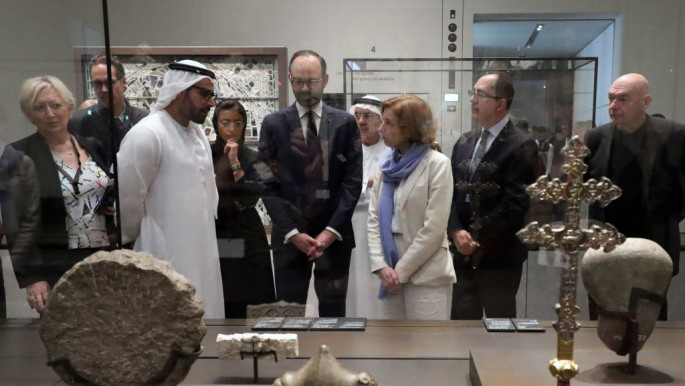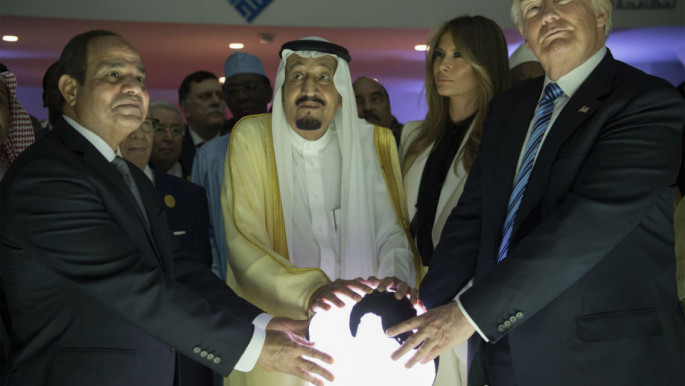
MbS and MbZ: Two princes in a hurry shake up the Gulf
After graduating from the Royal Military Academy Sandhurst in 1979, he served as commander of the helicopter squadrons before becoming commander of the air force in 1986, and then its chief of general staff in 1992.
After the death of his father Sheikh Zayed (the founder of the federation) in 2004, he was appointed Deputy Supreme Commander of the armed forces. Due to his half-brother and current Emir Sheikh Khalifa's illness, he has become the de facto leader of the country.
MbZ is a cultured, influential and well-connected man who has cultivated personal relationships with many leaders. Those privileged bonds were on display on November 8, 2017, for the inauguration of the Abu Dhabi Louvre Museum, attended by leaders of many foreign states, including France's Emmanuel Macron.
According to political expert Alexandre Kazerouni, this museum was first and foremost a means for the reigning family, and ultimately for the sheikh himself - as head of the Bani Fatima clan - to show their leadership and authority in all realms of power: Military, foreign policy, intelligence, economy and of course, culture.
An interventionist diplomacy
A study of MbZ's diplomatic choices shows two governing principles:
Firstly, actions against Iran and the Muslim Brotherhood have continued. This is not new. Already in 2006, Emirates leaders had supported a boycott initiative which had failed to find any echo in the other countries of the Gulf.
The next year, Qatar for instance chose to act independently and started a policy of rapprochement and mediation with Iran. Political expert Victor Gervais explains that this initiative by a rival country upset the Emirates' leaders who were temporarily discredited in the region because of their inability to "formulate alternative security propositions" in the aftermath of the Israel-Hizballah conflict of 2006.
The Gulf diplomatic crisis that began June 5 2017 made it clear that MbZ was able to learn from past mistakes when he chose to create an Abu Dhabi-Riyadh-Cairo axis based on privileged relationships and a convergence of economic and strategic interests.
 |
|
| French Prime Minister Edouard Philippe tours the Louvre Abu Dhabi Museum on February 10, 2018, on Saadiyat island in the Emirati capital, to launch the French-Emirati 'Year of Cultural Dialogue' [Getty] |
For the supporters of this axis, Qatar had too long tried to broaden its influence in the changing Middle East and North Africa region. Indeed, Damascus, Baghdad and Cairo are all going through periods of instability. Beirut has lost its place as the big business and oil assets hub it used to be. And the Maghreb has become more and more integrated to the European Union through the Barcelona process.
Secondly, the country's hard power has been reinforced. Its aim is clear: Establishing a military-industrial complex in Abu Dhabi and protecting the territory by building up military strength with investments and troops.
To this end, the federation has become the second largest arms importer in the Gulf. Along with Saudi Arabia, it has been financing a Joint Task Force in Mali (G5 Sahel) and has participated in the military coalition against the Houthi resistance in Yemen.
With regard to these two points, it seems clear that MbZ has influenced the young Saudi crown prince's policies. However, it would be remiss to not consider the MbS phenomenon as properly belonging to Saudi Arabia, too.
A brutal takeover of powerOn Saturday, November 4, 2017, Saudi authorities arrested dozens of the country's most important royal family members. Under the pretence of fighting corruption, this move illustrated the movement towards a centralisation and consolidation of power into the hands of the crown prince, which started in June 2017 when he replaced his cousin Muhammad bin Nayef as crown prince.
The most recent episode was the firing of the commander of the armed forces and other military heads at the end of February 2018. The now deputy prime minister is also the youngest defence secretary in the world, the president of the economic affairs and development council, and of the high council of Saudi Aramco.
 |
Under the pretence of fighting corruption, this move illustrated the movement towards a centralisation and consolidation of power into the hands of the crown prince |  |
Mohammed bin Salman, or 'MbS' is a 32-year-old law graduate from the King Saud University in Riyadh. This sets him apart from the other pretenders to the throne who are usually graduates of military academies or prestigious American or British universities.
At the age of just 24, he became special counsel to his father, who was then governor of Riyadh. In 2014 he joined the government, and in less than two years, he managed to get a hold on all strategic levels of power as well as the economic levers of the country.
The end of the welfare state?
MbS has a realistic view of the economic situation and a pragmatic idea of how to remedy the problem. He understands there is a need to reform the economy which has been suffering from the "curse of oil" - high prices and low incentive to work - and thus to develop the private sector outside of oil and gas and to raise the level of education. The "allowance" distributed by the state has been the result of the great wealth derived from exports.
Although resilient to the fall in oil prices, the economy has still gone through a dip in growth (falling from 4.1 percent in 2015 to 0.1 percent in 2017) as well as a double deficit.
The unemployment number has hovered around 12 percent. This forced Riyadh to take previously unheard of austerity measures in 2015, and decrease subsidies for power and water, and implement a cut in public salaries.
 |
The attempt to isolate Qatar that started in 2017 has also been a failure |  |
The adoption of the "2030 Vision" plan in April 2016 is an indicator of the end of the Saudi-style welfare state. It represents a very ambitious programme which might prove difficult to put into place, not least because of the global inertia of the Saudi economy.
The measures are meant to cut subsidies to the energy sector by 2020, provide stimuli to develop the private sector, enforce checks on public action, set up new fiscal legislation to bring taxes to 6.6 percent of non-oil GDP by 2020 and organise the partial privatisation of Saudi Aramco. All this should increase non-oil related revenues and lead to a budget surplus by 2020.
However, the place that the young prince intends to give to Wahhabi Islam shows that this is not unbridled modernism.
The kingdom's politics were built on a historical pact between the Saud family and the Wahhabi ulemas, the descendants of the Hanbali school of law leader, Muhammad ibn Abd al-Wahhab.
While MbS appeared to undermine the new consensus, with mass arrests beginning in June 2017 and intensifying in September 2017 of religious dissenters (including Salman al-Ouda), intellectuals and human rights advocates, this all forms part of a wide-reaching PR campaign. Indeed, Wahhabi leaders have long demonstrated the necessary flexibility that allows them to preserve their central position in the social sphere.
As for domestic policies, MbS appears in fact to take some inspiration from the Emirati model, which is a blend of vertical authoritarianism relying on political and charismatic legitimacy rather than a tribal and religious one, and the rejection of political Islam.
Read more: GCC crisis: Unresolved tensions plague Turkey-UAE relations
His determination to stem all forms of political Islam outside of the Wahhabi framework can be seen in his increasingly hardline stance against the Muslim Brotherhood. MbS benefitted from the 'modernisation' started at the end of King Abdullah's reign, and is conscious that his future allies are women and the under 35s. As a result, he has granted them many reforms, which also serve to convince the West of his 'open-mindedness', and improve the kingdom's image in the eyes of foreign investors.
In 2015, King Salman and his son were confronted with a regional geopolitical game in which Tehran intended to take back some of its influence and was the object of appeasement efforts on the part of the Obama administration.
They chose to be firm: The first international act of the young crown prince was to take the head of an Arab coalition in Yemen in March 2015, after the capital, Sanaa, was taken by the Houthis in 2014, with the alleged support of Iran.
The election of Donald Trump as president of the United States changed the situation: Riyadh now felt supported in its desire to contain Iran and force its "best Sunni enemies" to stop supporting the Muslim Brotherhood. This was evident in the tone Donald Trump took during his official visit in Saudi Arabia in the spring of 2017.
 |
|
| Trump, Sisi and Salman attend the the inauguration ceremony of the Global Center for Combating Extremist Ideology in Riyadh, Saudi Arabia on May 21, 2017 [AFP] |
And yet the kingdom has suffered important diplomatic failures in the last year. The coalition it has been heading in Yemen has come to a stalemate, and the assassination of former president Ali Abdullah Saleh has killed all hopes of an improvement, while the conflict has created a dire humanitarian disaster.
The attempt to isolate Qatar that started in 2017 has also been a failure: The Emirate has been able to use its alliances fully and has dug deep in its large change reserves to slow down the potentially fatal crisis.
Finally, its attack strategy in Lebanon has failed too: The (temporary) forced resignation of Prime Minister Saad Hariri meant to destabilise the alliance with Hizballah - which had allowed him to form a national union government under President Michel Aoun after months of power vacuum - was a failure.
The Saudi Kingdom is also dependent on American diplomatic strategy, sometimes for the worse: The United States has hardened its position against the Kremlin and the Riyadh-Moscow axis, which was hard to build, is under strain.
In addition, Donald Trump's unilateral and surprise move to recognise Jerusalem as capital of Israel last December was upsetting for the Saudi diplomatic strategy, which has been aimed at appeasing the Palestinians in provision of a future plan for peace.
Saudi Arabia - once a relatively infrequent actor on the international scene - appears to be building a key role for itself in the region, through proxy wars and diplomatic confrontations, but without taking on the role of the region's policeman.
And so, two lines of tension are progressively taking shape, following the economic and strategic rivalries between the regional powers rather than a simplistic confrontation between Sunni and Shias.
On the one hand we find a Saudi Arabia-United States-Israel axis, to which the UAE contribute as well as Egypt, and of which the UAE is the main creditor. They share a common hatred for the Iranian regime and the political Islam championed by the Muslim Brotherhood.
On the other hand, we find the de facto formation of a Qatar-Turkey axis which has boosted the commercial and military cooperation between the two countries.
Kuwait and Oman have kept to their tradition of diplomatic neutrality, although Kuwait has tried and failed to play the role of mediator in the regional crisis. Russia, with the help of Iran, has filled the vacuum left by western and regional powers in the Syrian conflict.
This is an edited translation of an article published by our partners at Orient XXI.



